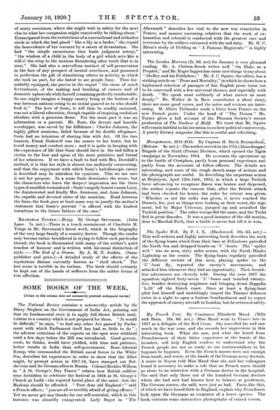SOME BOOKS OF THE WEEK.
[Notice in thiii column does not necessarily precisure subsequent review.]
The National Review contains a noteworthy article by Sir Harry Stephen on the Government of India Act, pointing out that its fundamental error is to apply full-blown British insti- tutions to a country which is not prepared for them. "It would be difficult," he says, "to find any other Act passed by Parlia- ment with which Parliament itself has had so little to do " ; the adverse criticisms of the experts on the spot were withheld until a few days before the Bill was introduced. Good govern- ment, he thinks, would have yielded, with time and patience, better results in India than self-government. Rear-Admiral Kemp, who commanded the British naval forces in the White sea, describes his experiences in order to show that the Allies might, by prompt action in 1917-18, have stamped out Bol- shevism and its German allies in Russia. Colonel Beckles Willson lu"A St. George's Day Fiasco" relates how British soldiers were forbidden to celebrate the festival in 1918 at St. George's Church at Ludd—the reputed burial-place of the saint—lest the Moslems should be offended. "Poor dear old England ! " said a French officer; "you are all so terribly afraid of giving offence." Yet we never get any thanks for our self-restraint, which in this instance was absurdly exaggerated. Lady Begot in "The
Aftermath" describes her visit to the new war cemeteries in France, and assures sorrowing relatives that the work of ex- humation and reburial is conducted with the greatest care and reverence by the soldiers entrusted with the sad duty. Mr. H. C. Biron's study of Fielding as "A Famous Magistrate" is highly interesting.


































 Previous page
Previous page